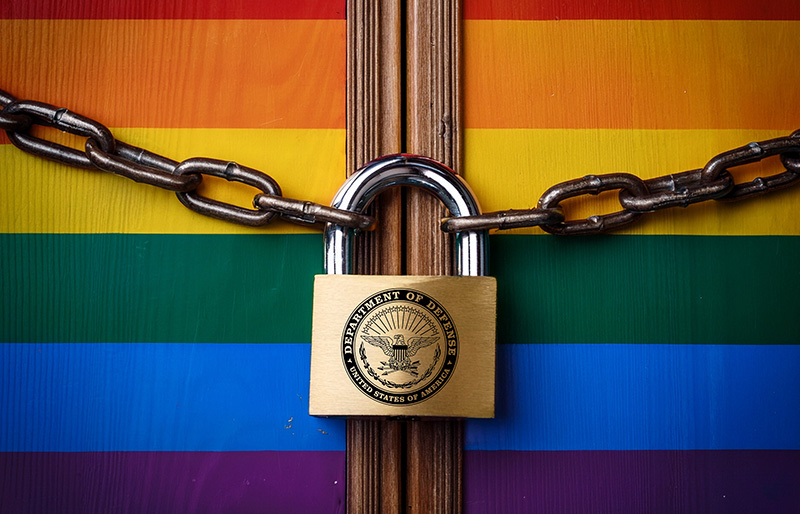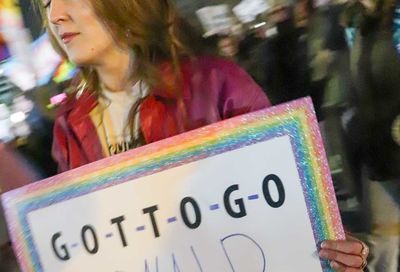Decriminalizing Gay Sex Helps Combat HIV/AIDS
A report claims that efforts to decriminalize homosexuality have helped some countries make better progress on reducing the spread of HIV.

A report released in mid-November, in advance of World AIDS Day on December 1, found that the decriminalization of same-sex relations by various countries appeared to be linked to progress in combating the spread of HIV/AIDS.
“Progress and the Peril” asserts that regions without criminal penalties for homosexuality or gender-nonconformity have made greater advancements in curbing the spread of HIV/AIDS.
According to the report, more countries took steps to decriminalize same-sex relations in 2022 than in any of the past 25 years. At the same time, however, countries with existing prohibitions on same-sex activity, such as Uganda, Kenya, and Ghana, are attempting to impose harsher penalties on people convicted of violating those laws.
The report claims that 129 of the world’s 194 countries do not criminalize same-sex relations, and an additional 24 don’t enforce existing criminal prohibitions, leaving only 41 countries with recent prosecutions for violating anti-sodomy laws.
The report also speaks to efforts to criminalize transgender identity, lays out public health and economic benefits of decriminalization, and discusses legislation designed to protect LGBTQ rights.
Looking at specific examples of countries that have eliminated or overturned their anti-LGBTQ laws, it also highlights the different political and legal pathways that other countries can follow when pursuing decriminalization.
From a public health perspective, criminalization of same-sex relations or homosexuality is linked to higher HIV rates.
For example, among African countries, men who have sex with men in countries criminalizing homosexuality were five times more likely to be living with HIV than in countries where same-sex relations are not punishable by jail time or death.
Additionally, men who have sex with men in countries with recent prosecutions under anti-sodomy statutes were 12 times more likely to be living with HIV/AIDS, according to data from Georgetown University’s HIV Policy Lab.
Criminalization also is shown to lead to inequality in terms of the populations that are affected by HIV.
Among a set of African countries, for example, where HIV rates are generally higher, there was a 7.2 point difference in HIV/AIDS prevalence between men who have sex with men and other adult men in countries without criminal statutes.
Comparatively, there was a 24.8 point difference in HIV prevalence among those same groups in countries that criminalize same-sex acts.
The report also finds that laws criminalizing homosexuality are likely to lead men who have sex with men to avoid getting tested for HIV, avoid taking advantages of prevention services, and avoid pursuing treatment for fear of being “outed” and prosecuted under such laws.
For example, following the passage of an anti-gay marriage law in Nigeria, avoidance of health care and fears of seeking health care increased significantly among men who have sex with men, according to a study published in The Lancet.
Countries that criminalize same-sex relations have citizens with lower rates of health knowledge concerning HIV status and viral suppression among all people with HIV.
Those same countries are also more likely to underreport population numbers of MSM, thereby undermining planning by government officials for the delivery of resources or funding needed to respond to the HIV/AIDS epidemic.
Additionally, anti-LGBTQ laws are more likely to have negative effects on mental health and health-seeking behaviors.
“The reason why we’re talking about the decriminalization of LGBTQ people around the world is because it has a clear link to HIV outcomes,” Professor Matthew Kavanagh, the director of the Center for Global Health Policy & Politics at Georgetown’s O’Neill Institute, told Health Policy Watch.
Regarding the economic rationale for pursuing decriminalization, on a macroeconomic level, having punitive laws in place may have significant economic costs.
For example, a set of World Bank studies showed that the cost of homophobia in India could represent between 0.14% to 1.7% of gross domestic product.
Another modeling study on the economic outcomes in over 132 countries between 1966 and 2011 found each legal measure that improved the legal environment for LGBTQ individuals wwas associated with a an increase in gross domestic product per capita equivalent to $2,000 U.S. dollars.
At a microeconomic level, having punitive laws in place criminalizing homosexuality can have negative impacts on workplace labor time, as LGBTQ workers who are prosecuted by the laws have to miss time at work due to arrests, prosecutions, and detention.
They may impact productivity due to physical and psychological trauma that restricts LGBTQ employees’ ability to fully participate in the workplace and may discourage investment in human capital when LGBTQ employees are denied opportunities for advancement or face discrimination at work.
According to the report, “[t]here is an association between LGBTQ+ anti-discrimination policies in firms and their performance. These data suggest that decriminalization and other steps toward creating LGBTQ+ inclusive legal environments benefits the economy.”
Mandeep Dhaliwal, UNDP’s director for HIV and Health, told Health Policy Watch that homophobia and punitive laws cost the world more than $126 billion per year — largely calculated in lost productivity and increased health costs.
UNAIDS Executive Director Winnie Byanyima called on those countries that still criminalize homosexuality to “step up and catch up,” adding, “Those who are pushing in the opposite direction, sadly such as my own country, Uganda, towards direct criminalization, are on the wrong side of public health, on the wrong side of economic growth, and on the wrong side of history.”
She noted that despite local efforts to cast decriminalization as a “Western agenda,” several countries in the global South are making strides towards eliminating or lessening restrictions on LGBTQ individuals, with Caribbean countries moving the fastest toward decriminalization, as evidenced by developments in countries like St. Kitts and Nevis, Barbados, and Antigua and Barbuda in recent years.
“This report shows how the world is increasingly rejecting the criminalization of LGBTQ people,” Byanyima added. “Instead of sending a message of condemnation and fear, these governments are encouraging their people to come into the health system and get what they need for their well-being.”
The report is a collaboration between Georgetown University’s Global HIV Policy Lab, the United National Development Programme, and the Global Network of People Living with HIV.
Support Metro Weekly’s Journalism
These are challenging times for news organizations. And yet it’s crucial we stay active and provide vital resources and information to both our local readers and the world. So won’t you please take a moment and consider supporting Metro Weekly with a membership? For as little as $5 a month, you can help ensure Metro Weekly magazine and MetroWeekly.com remain free, viable resources as we provide the best, most diverse, culturally-resonant LGBTQ coverage in both the D.C. region and around the world. Memberships come with exclusive perks and discounts, your own personal digital delivery of each week’s magazine (and an archive), access to our Member's Lounge when it launches this fall, and exclusive members-only items like Metro Weekly Membership Mugs and Tote Bags! Check out all our membership levels here and please join us today!

























You must be logged in to post a comment.